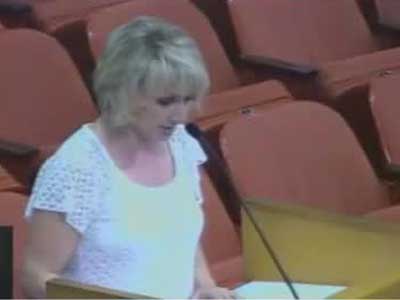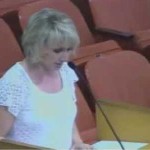You may not know her name, but you may know her speech. Lauren Hopson, currently a 3rd grade teacher, has become known around the Internet as the “Tired Teacher”. Hopson’s five-plus minute speech to the Knox County, Tennessee Board of Education has been shared all around social media among teachers and their supporters, and at last check had over 80,000 YouTube views. This video has struck a chord with many of those in the education community, especially here at The Educator’s Room. I recently had a chance to sit down and chat with Hopson over the phone about her career and her fight to make teachers heard and her hopes for more teachers to speak out.
[fusion_builder_container hundred_percent=”yes” overflow=”visible”][fusion_builder_row][fusion_builder_column type=”1_1″ background_position=”left top” background_color=”” border_size=”” border_color=”” border_style=”solid” spacing=”yes” background_image=”” background_repeat=”no-repeat” padding=”” margin_top=”0px” margin_bottom=”0px” class=”” id=”” animation_type=”” animation_speed=”0.3″ animation_direction=”left” hide_on_mobile=”no” center_content=”no” min_height=”none”]
via YouTube
When Lauren Hopson answered the phone, I could hear a cheery teacher who had recently gotten home from a long day at work. We easily started chatting, complaining about always being tired on a Wednesday night. Hopson seems like the type of teacher I would get along with in school. That’s how friendly she is. You could tell she loved teaching. As we started chatting, I asked her about her background. A 1990 graduate from the University of Tennessee with degrees in Psychology and Criminal Justice, teaching was a second career. She started working with a Knoxville area outdoor treatment facility helping teens with addiction and mental health issues. The shifts were long (85 hours a week), and she worked there for about 10 years. When she got married, she decided on a career changed and enrolled in an alternative certification program at UT that allowed her to get her certification and master’s at the same time. While going through the program, she and her classmates spent a year in the classroom as part of their internship- kind of a “trial by fire”. She began teaching about 13 years ago and has been at the same school the entire time.
When we began discussing her time as a teacher and what has changed leading up to her October 2nd speech, I could see what teaching had been for many of us who have been teaching for the last five-plus years. Hopson remembered that she and her fellow teachers at her school were allowed to be creative in subjects like science and plan curriculum that built on the knowledge mastered in the previous grade. When the standards and achievement requirements changed, subject areas like social studies and science were absorbed and taught through reading programs. Hopson and her co-workers to adapted the new requirements to work for their students. This worked for three years. Hopson had proof. One year, 14 out of 20 of her students scored “advanced on their end-of-the-year reading benchmark.” That changed when after three years, they were told be a county official that they had to follow exactly as Knox County mandated or “look for another job.” This was the beginning of a few changes that worried teachers. She spoke about the old way of being evaluated, how principals may not have come to take a look at a classroom unless necessary, and how maybe being evaluated every three years was not enough.
Hopson reminisced about how she and her fellow teachers could plan as they needed to plan.
“I liked having the freedom to rearrange things even though my other grade level mates didn’t choose to do that. I was able to correlate some of the stories that our big events were around. I still did [/fusion_builder_column][fusion_builder_column type=”1_1″ background_position=”left top” background_color=”” border_size=”” border_color=”” border_style=”solid” spacing=”yes” background_image=”” background_repeat=”no-repeat” padding=”” margin_top=”0px” margin_bottom=”0px” class=”” id=”” animation_type=”” animation_speed=”0.3″ animation_direction=”left” hide_on_mobile=”no” center_content=”no” min_height=”none”][these stories] wit them. We still shared materials. If one of us came out with a good idea, we shared with the other ones. We always planned that way.”
This changed with the addition of mandatory Professional Learning Community (PLC) and Grade Level meetings every week, taking away two days of class planning. Hopson and her fellow teachers were losing the time they needed to plan for their students. Instead, it was all about data, which was important but there were problems.
“If our data didn’t look good, [the administrators] would say, ‘Well, what do you need to do?’ We would say that we needed to slow down. [The kids] aren’t getting it.”
Hopson was constantly told they couldn’t slow down because of pacing, deadlines, etc. This added to new evaluations, with at least 61 indicators, makes it harder to be a teacher. Veteran teachers feel like new teachers, and new teachers have a whole new reason to be overwhelmed.
Flash forward to January 2012. The new teacher evaluation system is about to be rolled out. Hopson and others are beginning to have their doubts about the new evaluation system’s large list of criteria and have written a list of concerns. At the January board meeting, Hopson spoke about the concerns being expressed. Hopson believes that by and large, the items on the rubric should be found in an effective classroom, but only if each criterion is taken on an individual basis instead of trying to use them all at once. When she spoke to the board, she brought up couple of the following criteria that she was concerned about: transitions and sharing of information not related to the topic. This is hard to judge with the age group she teaches.
“Have you taught seven year olds lately? You mention a dog, [and] they’re going to talk about their neighbor’s puppies.”
She worries how scoring people on transitions and unnecessary information may affect teachers who may have special circumstances in their classroom like she had at the time.
When she made her comments in January 2012, she had a student who had a very profound processing disorder. During transition times, he often came up to her to discuss something that had nothing to do with their lesson. Sometimes he could take a long time to finish his conversation. She was worried that if she had an observation going at that moment that she would be required to make a choice between telling the child to sit down and get a better score or taking time to talk to the child while redirecting him.
“I said in my address [that] I’m going to choose the child every time.”
She was not just concerned about teachers similar to her situation dealing with evaluations. She was also concerned about how the evaluations ranked teachers on activities and finishing the lesson plan. She looked at this from the perspective of a teacher and that of a parent. The example she gave was that of her son’s math teacher at the time, who had already been evaluated, getting several two’s in her activities section. The reason: she didn’t finish her lesson because she took the time to go back over a math concept the students were struggling with and failed to reach the higher order thinking activity.
As a parent, Hopson appreciated that the teacher took the time to make sure that the students understood the math problems before moving on. As a teacher, she worried what affect this one lesson and evaluation could have on the teacher’s career.
“If an outsider who did not know her and did not witness that lesson saw that score, they would think that she was a substandard teacher because she fell below [stated] expectations. That’s just not right. She did what she needed to do as a teacher and got marked down for it.”
Hopson worries about the stress level and morale of teachers in Knox County.
“It’s been awful how many teachers that I have talked to that if they had another opportunity tomorrow, they would take it in a heartbeat. They’re not people who are slackers, who don’t want to put in effort.”
Have changes have been made since January 2012? She laughed a little when I asked this. Yes, more has been added to accommodate Common Core. But…
“None of the issues I brought up were addressed. Nothing happened.”
The stress of the announced and unannounced observations, planning lessons that meet all the criteria (which can be difficult if you have multiple subjects or preps), and losing the time to plan is making it difficult to teach. How is the board viewed by some in the district? The superintendent is appointed, not elected, which has worried some. He has made some effort to have teacher forums, but Hopson believes that teachers’ concerns are not being listened to.
To read part II, please click here. [/fusion_builder_column][/fusion_builder_row][/fusion_builder_container]





Leave a comment